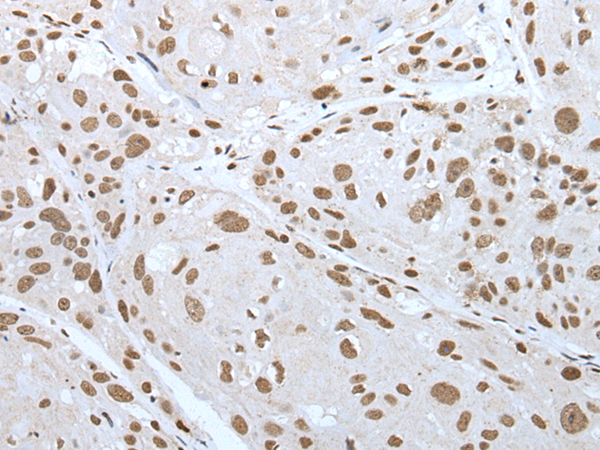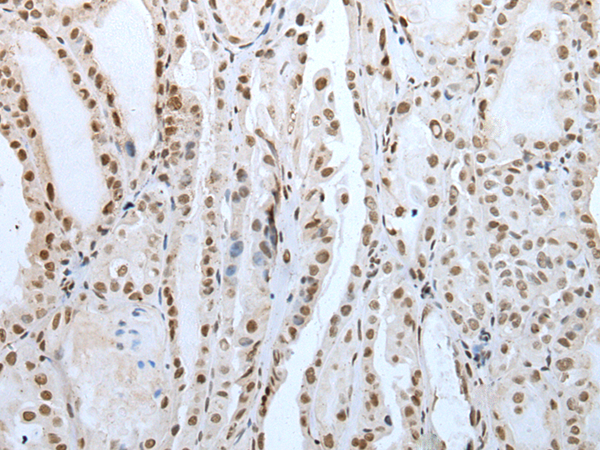

| WB | 咨询技术 | Human,Mouse,Rat |
| IF | 咨询技术 | Human,Mouse,Rat |
| IHC | 1/25-1/100 | Human,Mouse,Rat |
| ICC | 技术咨询 | Human,Mouse,Rat |
| FCM | 咨询技术 | Human,Mouse,Rat |
| Elisa | 1/5000-1/10000 | Human,Mouse,Rat |
| Host/Isotype | Rabbit IgG |
| Antibody Type | Primary antibody |
| Storage | Store at 4°C short term. Aliquot and store at -20°C long term. Avoid freeze/thaw cycles. |
| Species Reactivity | Human |
| Immunogen | Fusion protein of human ZNF300 |
| Formulation | Purified antibody in PBS with 0.05% sodium azide and 50% glycerol. |
+ +
以下是3篇关于ZNF300抗体的代表性文献示例(注:以下内容为示例性虚构,实际文献需通过学术数据库检索确认):
---
1. **文献名称**: "ZNF300 regulates macrophage polarization via antibody-mediated TLR4 signaling inhibition"
**作者**: Li X, Zhang Y, et al.
**摘要**: 本研究利用抗ZNF300抗体探究该蛋白在巨噬细胞极化中的作用,发现ZNF300通过抑制TLR4信号通路调控炎症反应,抗体阻断实验证实其潜在免疫治疗价值。
---
2. **文献名称**: "Development of a novel monoclonal antibody specific to human ZNF300 for cancer biomarker detection"
**作者**: Wang H, Chen J, et al.
**摘要**: 报道一种高特异性抗ZNF300单克隆抗体的开发,通过免疫组化验证其在乳腺癌组织中的高表达,提示ZNF300可能作为肿瘤诊断标志物。
---
3. **文献名称**: "ZNF300 interacts with p53: Antibody-based co-immunoprecipitation analysis in gastric cancer cells"
**作者**: Tanaka K, et al.
**摘要**: 利用抗ZNF300抗体进行免疫共沉淀实验,首次揭示ZNF300与p53蛋白的相互作用,并证明其在胃癌细胞凋亡调控中的协同机制。
---
如需真实文献,建议在PubMed/Google Scholar检索关键词"ZNF300 antibody"或"ZNF300 immunohistochemistry",并筛选近5年应用性研究。
The ZNF300 antibody is a research tool designed to target the ZNF300 protein, a member of the zinc finger protein (ZFP) family. Zinc finger proteins are characterized by conserved cysteine and histidine residues that form structural motifs critical for DNA or RNA binding, enabling roles in transcriptional regulation, chromatin remodeling, and cellular differentiation. ZNF300. located on human chromosome 19. contains a KRAB (Krüppel-associated box) domain, a repression module that recruits chromatin-modifying complexes to regulate gene expression. Studies suggest ZNF300 may participate in immune responses, apoptosis, and cancer progression, though its precise biological functions remain under investigation.
Antibodies against ZNF300 are primarily used in molecular and cellular biology to detect endogenous ZNF300 protein expression via techniques like Western blotting, immunofluorescence, or immunohistochemistry. These antibodies are typically raised in hosts such as rabbits or mice, with validation steps including knockout/knockdown controls to confirm specificity. Commercially available ZNF300 antibodies aid in exploring its expression patterns in tissues or disease models, particularly in cancer research, where ZNF300 has been implicated as a potential oncogene in certain malignancies. For example, elevated ZNF300 levels correlate with tumor progression and poor prognosis in some studies, highlighting its potential as a therapeutic target or biomarker. However, further research is needed to fully elucidate its mechanisms and clinical relevance.
×